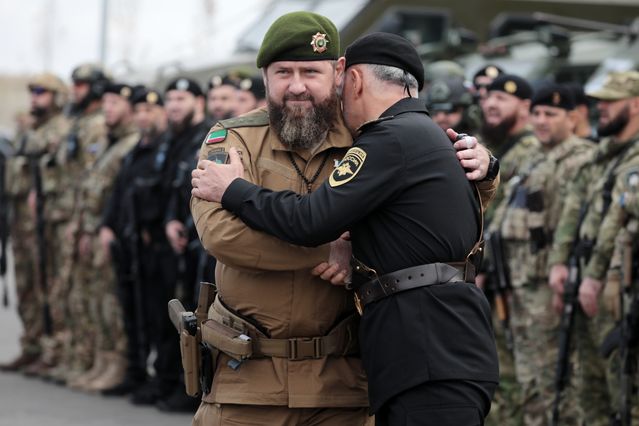President Vladimir Putin’s missile strikes on cities throughout Ukraine Monday drew condemnation from the West but praise from a growing chorus in Russia—critics who say that Moscow, despite the brutality of its invasion, hasn’t shown enough toughness.
Speaking hours after one of the broadest and most intense barrages of the war, Mr. Putin said Russia responded to a weekend attack on a key bridge that links Crimea, the Ukrainian peninsula that Moscow illegally seized in 2014, to Russia. Mr. Putin warned of a harsh response if Kyiv were to conduct further “terrorist attacks.”
“No one should have any doubts about this,” he said in a televised address.
Monday’s barrage didn’t inflict large-scale damage on Ukraine’s civilian infrastructure, suggesting that shortcomings of the Russian military, which has a limited number of missiles at its disposal, could crimp Mr. Putin’s ability to react.
Russia’s state-run TV celebrated the attacks on Ukraine by replaying footage of smoldering Ukrainian cities. It showed one British television journalist fleeing at the sound of explosions as he did a live stand-up broadcast from Kyiv. Several Russian commentators said they hope such retaliations become a key Russian tactic in the war going forward.
“The hope is that this is not a one-time act of vengeance, but a new system of warfare,” wrote Aleksandr Kots, a prominent Russian war correspondent on his Telegram channel. He called for continued bombing “throughout the depths of the Ukrainian state…until it loses its ability to function.”
Since invading Ukraine in February, Mr. Putin kept a largely stoic distance from seminal setbacks of the war, shrugging off the Russian retreat from Kyiv in the early weeks of the war and the sinking of a massive guided missile cruiser, the Moskva.
But a posture of indifference has been harder for Mr. Putin to hold as Russia’s military calamity in Ukraine has deepened. Some of Mr. Putin’s most ardent supporters, such as Ramzan Kadyrov, head of the Chechen Republic, have taken to blaming Russia’s military brass for botching the invasion.

Ramzan Kadyrov, head of the Chechen Republic, in Grozny, Russia, last week.
Photo: TASS/Yelena Afonina/Zuma Press
Russia’s pro-war bloggers have also stepped up criticism. Despite widespread reports of war crimes by Russian troops against civilians in Ukraine, even Russian official media outlets have lately suggested that the Russian troops have treated Ukraine too gingerly during the conflict.
Last week, after the attack on the bridge, Russian television anchor Vladimir Solovyov, a prominent pro-Kremlin voice, wrote on his Telegram page that “Ukraine must be plunged into the dark ages” and that Russia was suffering for treating Ukraine too kindly.
“What’s our plan?” he wrote. “This whole ‘game of humanism’ is interpreted as weakness and serves as an excuse to mock us.”
Ukrainian officials said that the attacks on Monday largely targeted the country’s electricity grid and utilities. Across the country, 11 people were killed and 87 were injured in the strikes, which hit major cities, including Kyiv, Dnipro, Zaporizhzhia, Kharkiv and Sumy, as well as Ivano-Frankivsk and Lviv in the west, which had remained relatively insulated from the war raging in the east and south.
While the missile attacks might have satisfied some demand for revenge among Russians who back the war, the intensity likely reflects Mr. Putin’s personal rage at setbacks in the war, said Andrei Kolesnikov, senior analyst at the Carnegie Endowment for International Peace in Moscow.
The bridge spanning the Kerch Strait and connecting Crimea with Russia was built at a breakneck speed at a cost of $4 billion after Russia’s seizure of the peninsula in 2014, and is Mr. Putin’s “favorite child” of the war, he said. While the missile attacks Monday pleased Russians who favor the war, Mr. Putin doesn’t need their encouragement, Mr. Kolesnikov said.
“He himself is an extreme hawk and is capable of making monstrous decisions,” Mr. Kolesnikov said. “This is his war and his personal revenge.”

The bridge connecting the Crimean Peninsula with Russia was hit by an explosion over the weekend.
Photo: ALEXEY PAVLISHAK/REUTERS
Ukrainian officials say that Russia in fact began launching missile attacks against civilian infrastructure during the past month, after the humiliating defeat of its troops in Kharkiv in September. Near the Ukrainian city of Kryvyi Rih, Russian missiles blew a hole in a dam, nearly causing a catastrophic flood.
With Russian forces in the field either mired down or retreating before a Ukrainian counterattack, officials in Moscow are hoping that Ukraine’s will to fight will be weakened by a cold winter with broken infrastructure.
Military analysts question whether Russia has enough high-tech weaponry to keep up a sustained assault. Indeed, some analysts said that many of the missiles fired on Monday fell far wide of what appeared to be their intended targets. Meanwhile, Ukrainian antiaircraft munitions largely prevent the Russians from launching more intense bombing from planes.
In Moscow, some officials suggest Moscow is just saving firepower for a more sustained attack. “So far, judging by the statements, the final decision to plunge Ukraine into the Middle Ages has not been made,” wrote Andrey Medvedev, vice speaker of the Moscow City Council, wrote on his Telegram on Monday. “Maybe that’s correct. Maybe it’s best to start doing it closer to winter.”
Write to Alan Cullison at alan.cullison@wsj.com and Yuliya Chernova at yuliya.chernova@wsj.com
Copyright ©2022 Dow Jones & Company, Inc. All Rights Reserved. 87990cbe856818d5eddac44c7b1cdeb8


